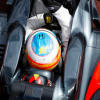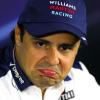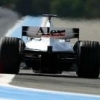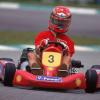There are roughly two categories in drivers, those who brake at the absolute last millimeter, and those who brake much earlier. Generally, it is a driver's personal style, but it can also be dictated by the track and corners.
In late braking, a driver brakes as deep into the corner as possible. Obviously, this can be a benefit when entering a corner side-by-side with another driver. But this benefit may have penalties, the first obvious one for Montreal is the brakes. The braking distance and time is shortened, and more heat is generated in such a short time. A brake's cooling system can dump only so much heat at a certain rate, and if all that heat is generated in 2.5 seconds instead of 3.0 seconds, all of the components exposed to this heat will suffer. The second problem is that late braking leaves no room for mistakes, and it is easier to get it wrong. If you get your distances wrong, or get forced off the racing line, then whatever you may have gained by late braking could have a larger penalty in correcting the mistake.
In Formula One with so much power and traction, those mistakes can be quickly corrected. But in cars with less power and/or traction, a loss in momentum can cost a driver over a second. This leads into the other end of the braking technique, braking earlier. But doing so, the chances of something going wrong is drastically reduced, and consistency attains a maximum value. A driver hits his line each time, carries maximum speed into a corner, and maintains momentum through and out of a corner. This starts to make sense in lower powered cars where momentum is critical, and endurance racing. And obviously, the technique is easier on the brakes and drivetrain.
Generally, braking earlier is better for the tires, they receive less abuse and live longer. But Formula One is an anomaly, the operating temperature of the tires is so small that a driver cannot afford to go so slow that they lose temperature, and grip drops off. The other end of spectrum is also there, too hot and the tires also lose grip. In Formula One they use many technical tricks to maintain a certain temperature, such as driver technique and adjustable vents on the brakes to control the rate of heat dissipation. The brakes and tires are linked so that heat transfers very quickly between these two systems.
Strange as it seems, either technique offers about the same lap times. Late braking may gain a driver a small fraction of a second each lap, but that driver has to be absolutely perfect for the entire race. One mistake can cost you a position very easily.



































